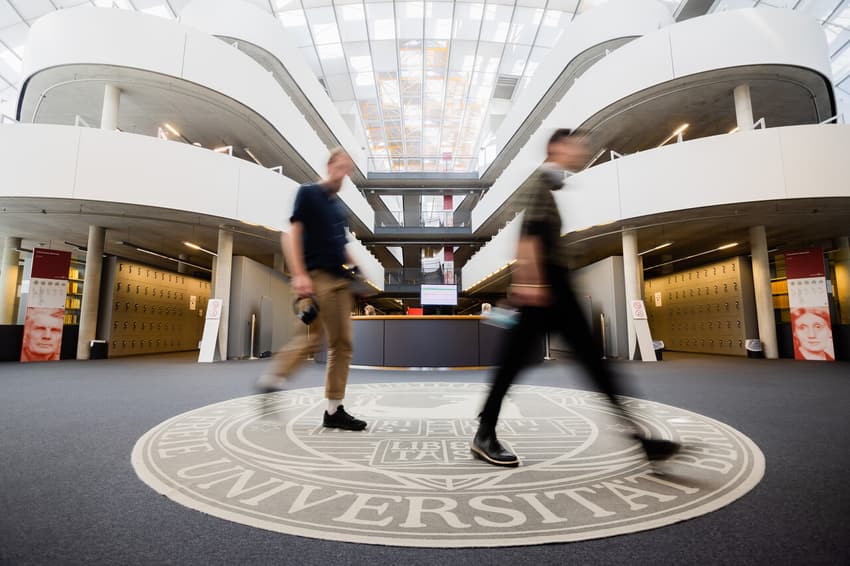10 reasons to study in Germany

From low tuition fees to offering hundreds of courses in English, Germany has a lot to offer for international students.
With its rich academic heritage, world-class institutions, vibrant culture and robust economy, Germany is a great place to pursue a higher education programme, be that a PhD, or bachelor's or master's degree. We've put together ten aspects of studying in Germany that make it so worthwhile.
1. International reputation
Germany has a long-standing tradition of academic excellence and is home to numerous world-class universities and research institutions renowned for their cutting-edge programmes.
As a result, the German higher education system has an excellent reputation worldwide and German degrees are recognised as a mark of a well-rounded and practical education.
READ ALSO: Two universities in Munich named best in Germany
German universities typically perform well in international rankings too; most recently, four German universities made it into the top 100 of the latest QS World University Ranking for 2024.
2. Tuition Fees
One of the most well-known advantages of studying in Germany is undoubtedly the absence of tuition fees, even for international students.
The only exception is the state of Baden-Württemberg, where non-EU international students are required to pay fees amounting to €1,500 per semester. Apart from that, students only have to pay a small semester fee, which also covers services such as a local transport ticket, and typically ranges between €100 and €450 per semester.
3. Cost of Living
Though living and rental costs are consistently on the rise throughout Germany, the cost of living for students is still relatively affordable for students if compared to other countries, such as the US and UK.
While expenses may vary depending on the city, student cities in Germany often offer affordable housing options, subsidised meals in canteens, and discounts on transport as well as cultural and recreational activities.
4. Variety of Study Programmes
Whether you're interested in engineering, natural sciences, humanities or the arts, you're more than likely to find a study programme to suit you in Germany.

Student Justin Kock practices pipetting in a biochemistry laboratory at the OWL medical faculty at Bielefeld University. Photo: picture alliance/dpa | Friso Gentsch
With nearly 450 recognised universities and over 17,000 degree programmes, Germany has a wide range of study options to suit almost every individual interest and aspiration.
5. English-Language programmes
If you think that studying in Germany is off-limits because of your limited German skills - think again.
An increasing number of German universities offer degree programmes in English.
English-language degree programmes are most common in the fields of economics and social sciences, but natural sciences, medicine and agricultural sciences are increasingly following suit.
READ ALSO: Essential German words to know as a student in Germany
While studying in English is a more common option for Master's programmes, more and more Bachelor's courses are also being offered in English, to cater to students who prefer to study in English or have limited German language proficiency. These programmes often focus on international aspects and provide opportunities for language learning alongside academic pursuits.
For many foreign students, degree programmes in English are a good opportunity to study in another country and to learn the local language in their free time as well as to improve their English skills during their studies.
In this database, you can search for study programmes in Germany and search by the language they are taught in.
6. Diverse community of international students
With around 350,000 international students living in the country, international students can feel right at home in Germany.
Many universities provide language tandems, mentoring programs, and events, to help foster exchanges and connections in the international student community.
7. Scholarship Programs
International students can apply for various scholarship programmes and financial subsidies in Germany, such as those offered by the German Academic Exchange Service (DAAD).
READ ALSO: How to stay in Germany after graduating from a German university
Although scholarships are relatively rare due to the absence of high tuition fees, there are opportunities for talented students to receive financial support and gain recognition.
8. Safety
Germany is known as being a safe place to live and offers a high level of security, offering a safe environment for students to freely move and live without concerns about their safety. Whether in cities or rural areas, during the day or at night, students can enjoy a sense of security and peace of mind.
9. Job prospects
Germany's strong and innovative economy provides excellent job prospects for students with a degree from a German university. Many companies based in Germany are industry and sector leaders, offering numerous career opportunities, particularly in technical or scientific disciplines.

The first apprentices and students employed by Thyssenkrupp Marine Systems (TKMS) at its Wismar site stand in the training workshop in Wismar. Photo: picture alliance/dpa | Jens Büttner
German universities, especially universities of applied sciences, are also known for their practical orientations; close collaborations with companies intertwine theory and practice are intertwined and help equip students with the necessary skills and experience for their future careers.
READ ALSO: What foreign students should know about applying for German citizenship
10. Good quality of life
German university cities are often ranked among the most beautiful and livable cities in the world. Beyond academics, students can enjoy a high quality of life with a wealth of recreational activities, including visits to museums, theatres, outdoor sports, historical sightseeing, and socialising at beer gardens, bars, and clubs.
Comments
See Also
With its rich academic heritage, world-class institutions, vibrant culture and robust economy, Germany is a great place to pursue a higher education programme, be that a PhD, or bachelor's or master's degree. We've put together ten aspects of studying in Germany that make it so worthwhile.
1. International reputation
Germany has a long-standing tradition of academic excellence and is home to numerous world-class universities and research institutions renowned for their cutting-edge programmes.
As a result, the German higher education system has an excellent reputation worldwide and German degrees are recognised as a mark of a well-rounded and practical education.
READ ALSO: Two universities in Munich named best in Germany
German universities typically perform well in international rankings too; most recently, four German universities made it into the top 100 of the latest QS World University Ranking for 2024.
2. Tuition Fees
One of the most well-known advantages of studying in Germany is undoubtedly the absence of tuition fees, even for international students.
The only exception is the state of Baden-Württemberg, where non-EU international students are required to pay fees amounting to €1,500 per semester. Apart from that, students only have to pay a small semester fee, which also covers services such as a local transport ticket, and typically ranges between €100 and €450 per semester.
3. Cost of Living
Though living and rental costs are consistently on the rise throughout Germany, the cost of living for students is still relatively affordable for students if compared to other countries, such as the US and UK.
While expenses may vary depending on the city, student cities in Germany often offer affordable housing options, subsidised meals in canteens, and discounts on transport as well as cultural and recreational activities.
4. Variety of Study Programmes
Whether you're interested in engineering, natural sciences, humanities or the arts, you're more than likely to find a study programme to suit you in Germany.

With nearly 450 recognised universities and over 17,000 degree programmes, Germany has a wide range of study options to suit almost every individual interest and aspiration.
5. English-Language programmes
If you think that studying in Germany is off-limits because of your limited German skills - think again.
An increasing number of German universities offer degree programmes in English.
English-language degree programmes are most common in the fields of economics and social sciences, but natural sciences, medicine and agricultural sciences are increasingly following suit.
READ ALSO: Essential German words to know as a student in Germany
While studying in English is a more common option for Master's programmes, more and more Bachelor's courses are also being offered in English, to cater to students who prefer to study in English or have limited German language proficiency. These programmes often focus on international aspects and provide opportunities for language learning alongside academic pursuits.
For many foreign students, degree programmes in English are a good opportunity to study in another country and to learn the local language in their free time as well as to improve their English skills during their studies.
In this database, you can search for study programmes in Germany and search by the language they are taught in.
6. Diverse community of international students
With around 350,000 international students living in the country, international students can feel right at home in Germany.
Many universities provide language tandems, mentoring programs, and events, to help foster exchanges and connections in the international student community.
7. Scholarship Programs
International students can apply for various scholarship programmes and financial subsidies in Germany, such as those offered by the German Academic Exchange Service (DAAD).
READ ALSO: How to stay in Germany after graduating from a German university
Although scholarships are relatively rare due to the absence of high tuition fees, there are opportunities for talented students to receive financial support and gain recognition.
8. Safety
Germany is known as being a safe place to live and offers a high level of security, offering a safe environment for students to freely move and live without concerns about their safety. Whether in cities or rural areas, during the day or at night, students can enjoy a sense of security and peace of mind.
9. Job prospects
Germany's strong and innovative economy provides excellent job prospects for students with a degree from a German university. Many companies based in Germany are industry and sector leaders, offering numerous career opportunities, particularly in technical or scientific disciplines.

German universities, especially universities of applied sciences, are also known for their practical orientations; close collaborations with companies intertwine theory and practice are intertwined and help equip students with the necessary skills and experience for their future careers.
READ ALSO: What foreign students should know about applying for German citizenship
10. Good quality of life
German university cities are often ranked among the most beautiful and livable cities in the world. Beyond academics, students can enjoy a high quality of life with a wealth of recreational activities, including visits to museums, theatres, outdoor sports, historical sightseeing, and socialising at beer gardens, bars, and clubs.
Join the conversation in our comments section below. Share your own views and experience and if you have a question or suggestion for our journalists then email us at [email protected].
Please keep comments civil, constructive and on topic – and make sure to read our terms of use before getting involved.
Please log in here to leave a comment.